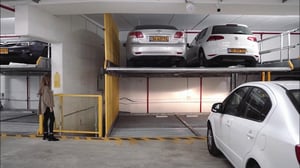
At Taylor Architecture & Design, we believe in pushing the boundaries of what’s possible in urban development. As space in cities becomes more limited, developers are seeking creative ways to maximize their return on investment.
That’s where mechanical parking systems come into play.
More than just a tool to save space, these systems are transforming how developers approach urban projects, offering numerous advantages that contribute to both the bottom line and the overall success of a development.
In this article, we’ll dive into the key benefits that mechanical parking systems offer to developers, exploring everything from cost efficiency to sustainability.
It’s time to rethink parking as an essential part of a building’s design and recognize the tangible impact it can have on your next project.
Maximized Land Use: Making Every Square Foot Count
In real estate, every inch of land matters. For developers in dense urban areas like New Jersey and Philadelphia, land is a precious commodity.
Traditional parking solutions, such as large surface lots or multi-level garages, often take up valuable space that could be used for more profitable purposes.
Mechanical parking systems offer a solution by compressing the amount of space needed to accommodate vehicles, freeing up that extra square footage for units, amenities, or green spaces.
Consider this: instead of dedicating a significant portion of your project to a sprawling parking structure, you can use that land for residential units or attractive communal spaces—both of which can increase property value and generate additional revenue.
This maximization of land use is particularly beneficial in medium-sized projects (50 to 200 units) where every square foot counts toward profitability.
At Taylor Architecture & Design, we work closely with developers to ensure that the space saved by mechanical parking is put to its best use.
Whether it’s adding more units or incorporating desirable amenities like rooftop gardens or fitness centers, we help developers realize the full potential of their project sites.
Cost Efficiency: Savings that Add Up Over Time
One of the biggest financial advantages mechanical parking offers developers is the potential to reduce overall construction costs by requiring significantly less space and structural levels
of parking.
Traditional parking garages may require deep excavation, extensive concrete work, and costly structural reinforcements to support multiple levels. Mechanical parking systems, on the other hand, may eliminate the need for large-scale excavation and heavy structural materials, leading to significant savings in labor and construction expenses.
These savings can help offset the cost of installing the system itself, making it a more financially viable option in the long run.
In some cases, eliminating multiple levels of structure in lieu of a multi-level mechanical parking system can result in an overall cost savings.
For many projects, it is the only way to make the project viable. This is especially true for urban buildings with smaller footprints and limited zoning or code height limitations where the only option is subterranean parking.
Another key factor to consider is the advancement of mechanical parking technology over time. As these systems become more widely adopted, improvements in automation, robotics, and manufacturing processes will lead to lower production costs and increased efficiency.
Much like other emerging technologies, economies of scale will make mechanical parking systems more affordable for developers in the coming years, further enhancing their
financial appeal.
Mechanical parking isn’t just about saving space—it’s about strategically saving money,
improving project feasibility, and future-proofing developments with a more adaptable, cost-effective parking solution.
Increased Unit Density: More Units, More Revenue
The ability to increase unit density is one of the biggest advantages mechanical parking offers to developers. By using a smaller footprint for parking, you can fit more units into the same space, ultimately increasing the project’s profitability.
For medium-sized developments in places like Jersey City or Philadelphia, where every additional unit represents a significant boost in revenue, this can be a game-changer.
Developers no longer have to choose between providing sufficient parking and maximizing the number of units in a building. Mechanical systems enable you to do both.
This balance is particularly important in urban areas where zoning laws require a certain number of parking spaces per residential unit. With a mechanical system, developers can meet those requirements without sacrificing valuable space for living units.
At Taylor Architecture & Design, we see this as a win-win situation: developers get the density they need to make their projects financially viable, while tenants benefit from modern, well-designed spaces.
Appealing to Urban Renters: Modern Amenities for Modern Living
Today’s urban renters expect convenience, efficiency, and modern amenities—and parking is no exception. Mechanical parking systems not only save space but also offer a high-tech, streamlined parking experience that can set your building apart from the competition.
In cities like Philadelphia and Morristown, where residents are accustomed to cutting-edge amenities, offering mechanical parking can make your property more attractive to prospective tenants.
Think about it: renters want to live in buildings that are innovative and forward-thinking. A mechanical parking system signals to tenants that the building is designed with modern conveniences in mind, offering a seamless, hassle-free experience from the moment they park their car.
At Taylor Architecture & Design, we believe that tenant satisfaction starts with thoughtful design. By incorporating mechanical parking systems, developers can offer an amenity that speaks to the needs and expectations of today’s urban residents.
Sustainability: Building for the Future
Sustainability is no longer an option—it’s a necessity. Developers who embrace eco-friendly solutions are not only doing their part for the environment but are also meeting the growing demand for sustainable living spaces. Mechanical parking systems contribute to sustainability in several ways.
First, they reduce the construction footprint, requiring fewer materials and less land. Second, they lower emissions, as drivers spend less time circling for a parking spot.
Finally, these systems can be integrated into broader green building initiatives, aligning with LEED certification goals and other sustainability frameworks.
Incorporating mechanical parking into a development is a step toward a greener future. At Taylor Architecture & Design, we help developers design buildings that are not only functional but also environmentally responsible.
Mechanical parking systems can be a key part of a sustainable development strategy, helping to reduce the project’s overall environmental impact while appealing to eco-conscious tenants.
Conclusion: A Smarter, More Profitable Approach to Urban Development
Mechanical parking systems offer developers numerous advantages that go beyond just saving space.
From maximizing land use and boosting profitability to enhancing sustainability and tenant appeal, these systems are transforming the way we think about parking in multifamily developments.
At Taylor Architecture & Design, we’re proud to be at the forefront of this movement, working with developers to incorporate smart, efficient parking solutions into their projects.
As urban spaces continue to evolve, mechanical parking will play an increasingly important role in the success of multifamily developments.
Are you ready to explore how mechanical parking can elevate your next project? Reach out to Taylor Architecture & Design today, and let’s work together to create the future of urban living.
Contact Us Today
Interested in exploring the potential of partnering with Taylor Architecture and Design for your next project?
Whether you're a real estate developer seeking land entitlement expertise or a property owner looking to maximize the value of your investment, we're here to help.
Our team brings a wealth of experience and a track record of success to every project we undertake.
Contact us today:
T: +1 (908) 226 5515
E: info@taylorarchdesign.com



